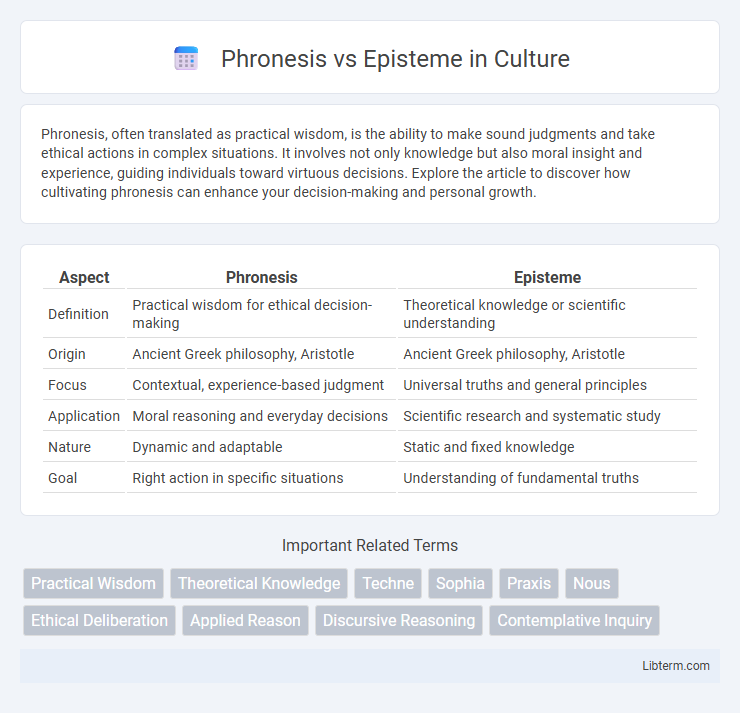Phronesis, often translated as practical wisdom, is the ability to make sound judgments and take ethical actions in complex situations. It involves not only knowledge but also moral insight and experience, guiding individuals toward virtuous decisions. Explore the article to discover how cultivating phronesis can enhance your decision-making and personal growth.
Table of Comparison
| Aspect | Phronesis | Episteme |
|---|---|---|
| Definition | Practical wisdom for ethical decision-making | Theoretical knowledge or scientific understanding |
| Origin | Ancient Greek philosophy, Aristotle | Ancient Greek philosophy, Aristotle |
| Focus | Contextual, experience-based judgment | Universal truths and general principles |
| Application | Moral reasoning and everyday decisions | Scientific research and systematic study |
| Nature | Dynamic and adaptable | Static and fixed knowledge |
| Goal | Right action in specific situations | Understanding of fundamental truths |
Understanding Phronesis and Episteme
Phronesis, often translated as practical wisdom, emphasizes moral insight and ethical decision-making derived from experience and contextual understanding. Episteme refers to theoretical knowledge or scientific understanding based on universal truths and systematic inquiry. Understanding the distinction highlights how phronesis guides virtuous action in real-life situations, while episteme provides foundational, objective knowledge.
Historical Roots of Phronesis and Episteme
Phronesis and episteme trace their historical roots to ancient Greek philosophy, primarily articulated by Aristotle in his ethical and epistemological works. Phronesis, often translated as practical wisdom, emphasizes moral insight and the capacity for sound judgment in variable human situations, rooted in lived experience and ethical understanding. Episteme refers to scientific knowledge or universal truths derived through logic and reason, grounded in systematic inquiry and demonstrable evidence.
Key Differences Between Phronesis and Episteme
Phronesis refers to practical wisdom or moral intelligence used in everyday decision-making, focusing on contextual judgment and ethical considerations. Episteme denotes theoretical knowledge or scientific understanding, emphasizing universal truths and systematic, objective inquiry. The key difference lies in phronesis engaging with situational, action-oriented knowledge, while episteme centers on abstract, propositional knowledge.
The Role of Phronesis in Practical Wisdom
Phronesis, often translated as practical wisdom, involves the capacity to make prudent decisions in complex, real-life situations by balancing ethical considerations and contextual factors. Unlike episteme, which represents theoretical knowledge or scientific understanding, phronesis emphasizes action-oriented insight and moral reasoning essential for effective leadership and everyday problem-solving. Its role is crucial in bridging abstract knowledge with concrete practice, enabling individuals to act virtuously and adaptively in dynamic environments.
Episteme: The Nature of Theoretical Knowledge
Episteme represents the nature of theoretical knowledge grounded in universal truths and scientific understanding, emphasizing objective, systematic inquiry and factual certainty. It contrasts with Phronesis by prioritizing abstract reasoning and general principles over practical wisdom or context-dependent decision-making. Episteme is foundational in disciplines like mathematics, natural sciences, and philosophy, where knowledge is formalized and validated through rigorous methods.
Applications of Phronesis in Everyday Life
Phronesis, or practical wisdom, guides ethical decision-making and adaptive problem-solving in daily situations such as personal relationships, workplace challenges, and civic responsibilities. Unlike episteme, which is theoretical knowledge, phronesis emphasizes experiential understanding and moral insight to navigate complex social contexts. This application fosters sound judgments that balance individual needs with communal well-being, enhancing interpersonal dynamics and leadership effectiveness.
Episteme in Scientific and Academic Contexts
Episteme represents systematic, theoretical knowledge rooted in scientific principles and empirical evidence, forming the foundation of academic disciplines such as physics, biology, and mathematics. It emphasizes objective truth and reproducibility, guiding research methodologies and scholarly inquiry to generate universal laws and validated theories. Episteme's role in science and academia ensures rigorous standards for knowledge validation, distinguishing it from practical wisdom or phronesis.
Philosophical Perspectives on Phronesis vs Episteme
Phronesis, often translated as practical wisdom, emphasizes ethical judgment and action within the complexities of human life, contrasting with episteme, which represents theoretical knowledge derived from universal truths and scientific inquiry. Philosophers like Aristotle distinguished phronesis as a moral virtue necessary for discerning the right course in varied situations, while episteme pertains to objective, demonstrable knowledge independent of personal circumstances. The philosophical debate highlights the complementary roles of both concepts, with phronesis grounding ethical decision-making in context and episteme providing foundational, systematic understanding.
Balancing Phronesis and Episteme in Decision-Making
Balancing phronesis and episteme in decision-making enhances both practical wisdom and theoretical understanding, allowing leaders to navigate complex situations effectively. Phronesis, or practical wisdom, guides context-sensitive judgments, while episteme provides systematic knowledge and factual accuracy. Integrating these two forms of knowledge ensures decisions are both ethically sound and intellectually rigorous, fostering better outcomes in diverse scenarios.
The Modern Relevance of Phronesis and Episteme
Phronesis, or practical wisdom, remains crucial in modern decision-making processes where context-sensitive judgment and ethical considerations prevail, especially in fields like leadership, medicine, and education. Episteme, representing theoretical knowledge or scientific understanding, drives advancements through systematic research and evidence-based practices. Integrating phronesis with episteme fosters comprehensive solutions that balance empirical data with human values, enhancing effectiveness in contemporary problem-solving.
Phronesis Infographic

 libterm.com
libterm.com